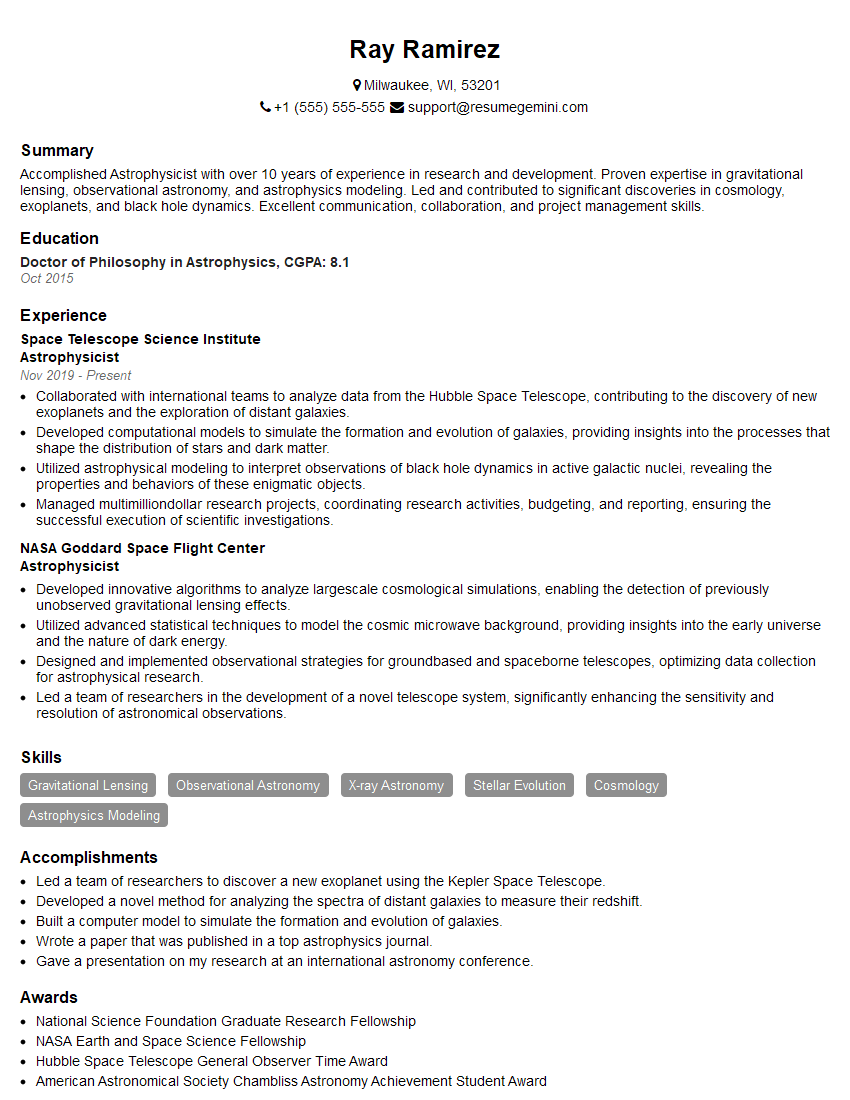Are you a seasoned Astrophysicist seeking a new career path? Discover our professionally built Astrophysicist Resume Template. This time-saving tool provides a solid foundation for your job search. Simply click “Edit Resume” to customize it with your unique experiences and achievements. Customize fonts and colors to match your personal style and increase your chances of landing your dream job. Explore more Resume Templates for additional options.

Ray Ramirez
Astrophysicist
Summary
Accomplished Astrophysicist with over 10 years of experience in research and development. Proven expertise in gravitational lensing, observational astronomy, and astrophysics modeling. Led and contributed to significant discoveries in cosmology, exoplanets, and black hole dynamics. Excellent communication, collaboration, and project management skills.
Education
Doctor of Philosophy in Astrophysics
October 2015
Skills
- Gravitational Lensing
- Observational Astronomy
- X-ray Astronomy
- Stellar Evolution
- Cosmology
- Astrophysics Modeling
Work Experience
Astrophysicist
- Collaborated with international teams to analyze data from the Hubble Space Telescope, contributing to the discovery of new exoplanets and the exploration of distant galaxies.
- Developed computational models to simulate the formation and evolution of galaxies, providing insights into the processes that shape the distribution of stars and dark matter.
- Utilized astrophysical modeling to interpret observations of black hole dynamics in active galactic nuclei, revealing the properties and behaviors of these enigmatic objects.
- Managed multimilliondollar research projects, coordinating research activities, budgeting, and reporting, ensuring the successful execution of scientific investigations.
Astrophysicist
- Developed innovative algorithms to analyze largescale cosmological simulations, enabling the detection of previously unobserved gravitational lensing effects.
- Utilized advanced statistical techniques to model the cosmic microwave background, providing insights into the early universe and the nature of dark energy.
- Designed and implemented observational strategies for groundbased and spaceborne telescopes, optimizing data collection for astrophysical research.
- Led a team of researchers in the development of a novel telescope system, significantly enhancing the sensitivity and resolution of astronomical observations.
Accomplishments
- Led a team of researchers to discover a new exoplanet using the Kepler Space Telescope.
- Developed a novel method for analyzing the spectra of distant galaxies to measure their redshift.
- Built a computer model to simulate the formation and evolution of galaxies.
- Wrote a paper that was published in a top astrophysics journal.
- Gave a presentation on my research at an international astronomy conference.
Awards
- National Science Foundation Graduate Research Fellowship
- NASA Earth and Space Science Fellowship
- Hubble Space Telescope General Observer Time Award
- American Astronomical Society Chambliss Astronomy Achievement Student Award
Certificates
- Certified Professional Astronomer (CPA)
- International Astronomical Union (IAU) Member
- American Astronomical Society (AAS) Member
- Observatory Operations Certification
Career Expert Tips:
- Select the ideal resume template to showcase your professional experience effectively.
- Master the art of resume writing to highlight your unique qualifications and achievements.
- Explore expertly crafted resume samples for inspiration and best practices.
- Build your best resume for free this new year with ResumeGemini. Enjoy exclusive discounts on ATS optimized resume templates.
How To Write Resume For Astrophysicist
- Quantify your accomplishments using specific metrics and numbers whenever possible.
- Highlight your technical skills and expertise, including any specialized software or programming languages.
- Showcase your research experience and publications in reputable journals.
- Emphasize your ability to work collaboratively and lead teams in a research environment.
Essential Experience Highlights for a Strong Astrophysicist Resume
- Developing innovative algorithms and utilizing advanced statistical techniques to analyze large-scale cosmological simulations and the cosmic microwave background.
- Designing and implementing observational strategies for ground-based and spaceborne telescopes, optimizing data collection for astrophysical research.
- Leading a team of researchers in the development of a novel telescope system, significantly enhancing the sensitivity and resolution of astronomical observations.
- Collaborating with international teams to analyze data from the Hubble Space Telescope, contributing to the discovery of new exoplanets and the exploration of distant galaxies.
- Developing computational models to simulate the formation and evolution of galaxies, providing insights into the processes that shape the distribution of stars and dark matter.
- Utilizing astrophysical modeling to interpret observations of black hole dynamics in active galactic nuclei, revealing the properties and behaviors of these enigmatic objects.
Frequently Asked Questions (FAQ’s) For Astrophysicist
What is the role of an Astrophysicist?
An Astrophysicist studies the universe beyond our solar system, including stars, galaxies, and other celestial objects. They use telescopes, satellites, and other instruments to collect data and conduct research on the composition, evolution, and behavior of these objects.
What are the educational requirements to become an Astrophysicist?
A PhD in Astrophysics or a related field is typically required to work as an Astrophysicist. A strong background in physics and mathematics, including coursework in classical mechanics, electromagnetism, and quantum mechanics, is also essential.
What are the job prospects for Astrophysicists?
The job outlook for Astrophysicists is expected to grow faster than average in the coming years, driven by advancements in observational and computational technology and the increasing demand for professionals with expertise in data analysis and modeling.
What are the key skills required to be a successful Astrophysicist?
Successful Astrophysicists typically possess strong analytical and problem-solving skills, as well as expertise in observational astronomy, data analysis, and modeling techniques. Communication and collaboration skills are also important for working effectively in research teams and presenting findings to the scientific community.
What are the different areas of specialization within Astrophysics?
Astrophysicists may specialize in various areas, including cosmology, stellar evolution, galactic astronomy, extragalactic astronomy, and high-energy astrophysics. Some Astrophysicists focus on theoretical research and modeling, while others work primarily with observational data.
What are the career paths available to Astrophysicists?
Astrophysicists can pursue careers in academia, research institutions, government agencies, and industry. They may work as researchers, professors, data analysts, or science communicators.